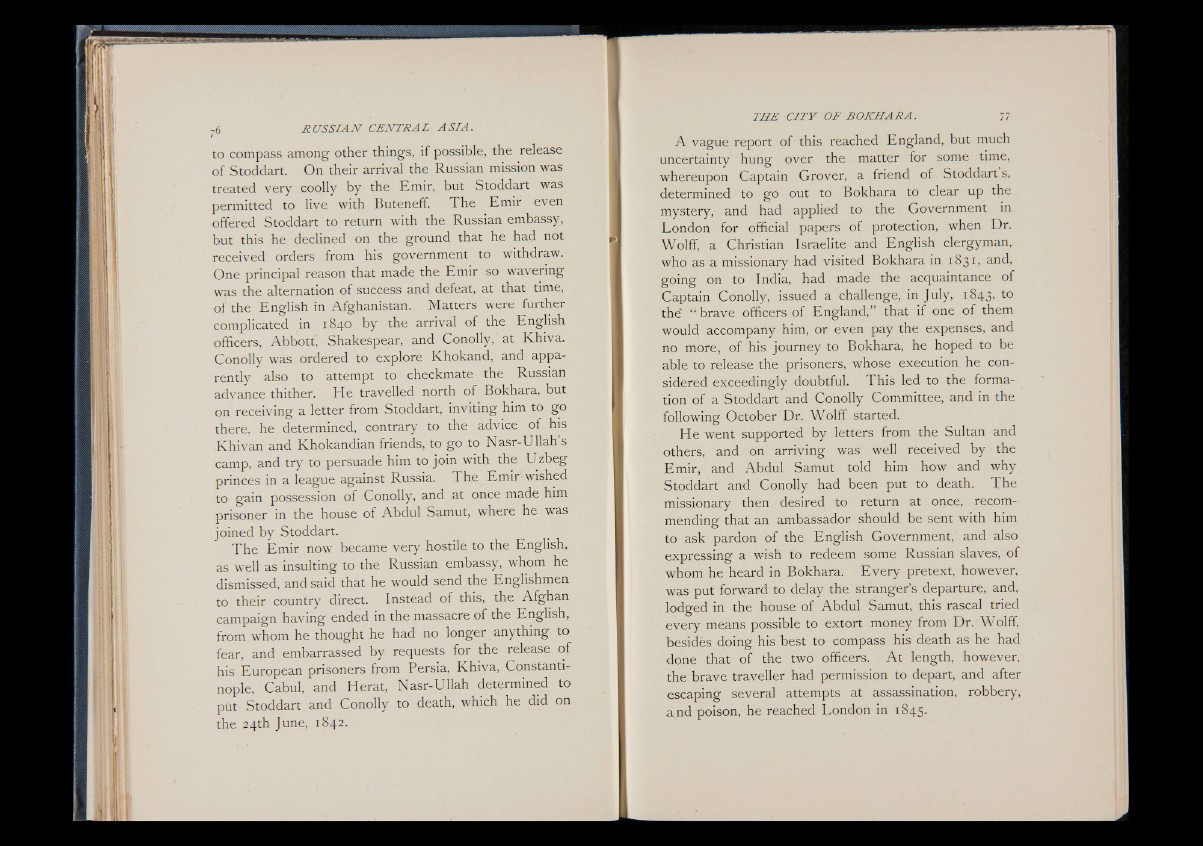
to compass among other things, if possible, the release
of Stoddart. On their arrival the Russian mission was
treated very coolly by the Emir, but Stoddart was
permitted to live with Buteneff. The Emir even
offered Stoddart to return with the Russian embassy,
but this he declined on the ground that he had not
received orders from his government to withdraw.
One principal reason that made the Emir so wavering
was the alternation of success and defeat, at that time,
of the English in Afghanistan. Matters were further
complicated in 1840 by the arrival of the English
officers, Abbott, Shakespear, and Conolly, at Khiva.
Conolly was ordered to explore Khokand, and apparently
also to attempt to checkmate the Russian
advance thither. He travelled north of Bokhara, but
on receiving a letter from Stoddart, inviting him to go
there, he determined, contrary to the advice of his
Khivan and Khokandian friends, to go to Nasr-Ullah s
camp, and try to persuade him to join with the Uzbeg
princes in a league against Russia. The Emir wished
to gain possession o f Conolly, and at once made him
prisoner in the house of Abdul Samut, where he was
joined by Stoddart.
The Emir now became very hostile to the English,
as well as insulting to the Russian embassy, whom he
dismissed, and said that he would send the Englishmen
to their country direct. Instead of this, the Afghan
campaign having ended in the massacre of the English,
from whom he thought he had no longer anything to
fear, and embarrassed by requests for the release of
his European prisoners from Persia, Khiva, Constantinople,
Cabul, and Herat, Nasr-Ullah determined to
put Stoddart and Conolly to death, which he did on
the 24th June, 1842.
A vague report of this reached England, but much
uncertainty hung over the matter for some time,
whereupon Captain Grover, a friend of Stoddart s,
determined to go out to Bokhara to clear up the
mystery, and had applied to the Government in
London for official papers of protection, when Dr.
Wolff, a Christian Israelite and English clergyman,
who as a missionary had visited Bokhara in 1831, and,
going on to India, had made the acquaintance of
Captain Conolly, issued a challenge, in July, 1843, to
thé “ brave officers of England,” that if one of them
would accompany him, or even pay the expenses, and
no more, of his journey to Bokhara, he hoped to be
able to release the prisoners, whose execution he considered
exceedingly doubtful. This led to the formation
of a Stoddart and Conolly Committee, and in the
following October Dr. Wolff started.
He went supported by letters from the Sultan and
others, and on arriving was well received by the
Emir, and Abdul Samut told him how and why
Stoddart and Conolly had been put to death. The
missionary then desired to return at once, recommending
that an ambassador should be sent with him
to ask pardon of the English Government, and also
expressing a wish to redeem some Russian slaves, of
whom he heard in Bokhara. Every pretext, however,
was put forward to delay the stranger’s departure, and,
lodged in the house of Abdul Samut, this rascal tried
every means possible to extort money from Dr. Wolff,
besides doing his best to compass his death as he had
done that of the two officers. A t length, however,
the brave traveller had permission to depart, and after
escaping several attempts at assassination, robbery,
and poison, he reached London in 1845.